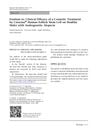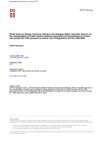 5 citations,
February 2013 in “Dermatology and therapy”
5 citations,
February 2013 in “Dermatology and therapy” Crescina® lotion helps reduce hair loss and increase hair growth in males with androgenetic alopecia.
 April 2013 in “Dermatology and therapy”
April 2013 in “Dermatology and therapy” Crescina treatment improves hair resistance and reduces hair loss.
 151 citations,
May 2014 in “American Journal of Clinical Dermatology”
151 citations,
May 2014 in “American Journal of Clinical Dermatology” Effective treatments for male pattern baldness include oral finasteride and topical minoxidil, while topical minoxidil is best for female pattern baldness.
 3 citations,
January 2017 in “Journal of cosmetology & trichology”
3 citations,
January 2017 in “Journal of cosmetology & trichology” The nutritional supplement improved hair quality and reduced hair loss.
 1 citations,
May 2017 in “InTech eBooks”
1 citations,
May 2017 in “InTech eBooks” Some cosmetic procedures show promise for treating hair loss, but more research is needed to confirm their safety and effectiveness.
 June 2023 in “Stem cell reviews and reports”
June 2023 in “Stem cell reviews and reports” Stem cell therapies could be a promising alternative for hair loss treatment, but more research is needed to understand their full potential and safety.
 13 citations,
December 2017 in “CNS Neuroscience & Therapeutics”
13 citations,
December 2017 in “CNS Neuroscience & Therapeutics” Finasteride affects young male rats' brain function and behavior negatively.
 3 citations,
June 2011 in “EFSA Journal”
3 citations,
June 2011 in “EFSA Journal” Spermidine's effect on hair growth is not proven.
 2 citations,
September 2020 in “Schweizer Archiv für Tierheilkunde”
2 citations,
September 2020 in “Schweizer Archiv für Tierheilkunde” Swiss Holstein cattle with curly, short hair carry genes from the Simmental breed.
 2 citations,
April 2016 in “Medical Hypotheses”
2 citations,
April 2016 in “Medical Hypotheses” Antioxidants might help prevent pressure ulcers, but more research is needed to find effective ones.
 August 2021 in “EMC - AKOS - Trattato di Medicina”
August 2021 in “EMC - AKOS - Trattato di Medicina” Acquired alopecia is hair loss that can be reversible or irreversible, depending on whether the hair follicle is destroyed.
102 citations,
April 2014 in “PloS one” Wharton’s Jelly stem cells from the umbilical cord improve skin healing and hair growth without scarring.
 2 citations,
January 2022 in “Genetics Research”
2 citations,
January 2022 in “Genetics Research” Using hemocoagulase with platelet-rich plasma in hip replacement can lessen blood loss and improve healing and blood clotting.












